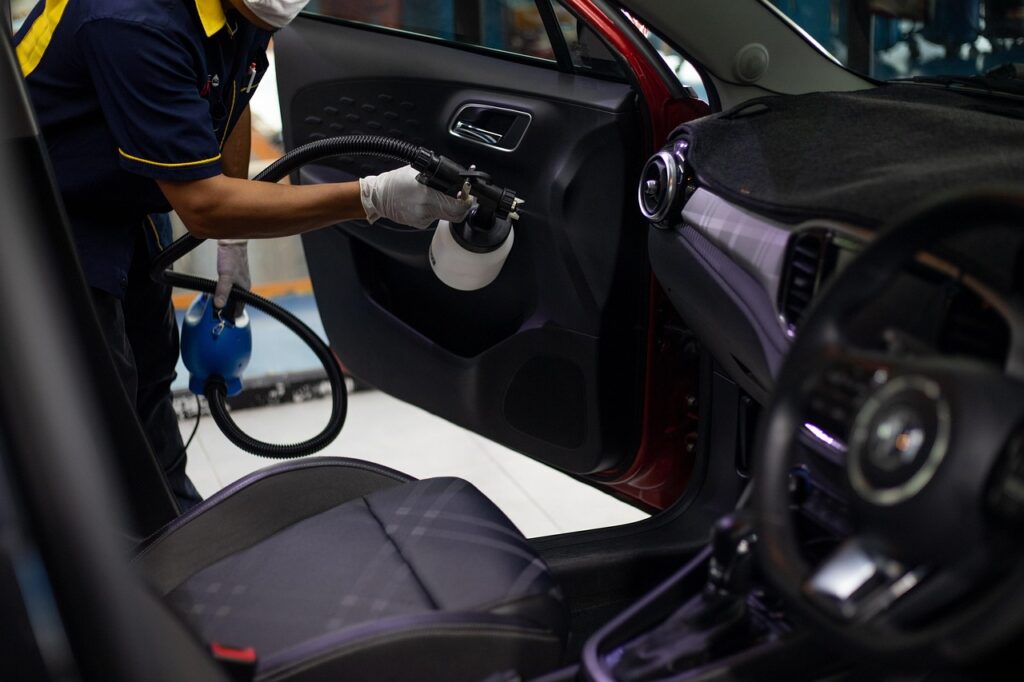Bad car smells, whether originating from food spills, tobacco use, or simply the passage of time, can diminish the enjoyment of your vehicle and even impact its resale value. Yet these odors can be effectively mitigated using a strategic approach. Herein, we provide seven key tips, encompassing regular cleaning practices and the use of specific products, to help restore your car’s interior freshness. Join us as we explore these practical measures, offering new insights into maintaining the aesthetic appeal of your vehicle’s interior.
Identify the Source of the Smell
The initial step in eradicating unpleasant odors from your car is to pinpoint the origin of the smell. This process, known as smell detection, requires a thorough and meticulous inspection of the vehicle. It involves checking all possible areas where the odor may have originated from, including the upholstery, carpeting, air vents, and even under the seats.
Source identification is a vital aspect of this process. It helps in determining the appropriate measures to eliminate the odor permanently. For instance, a musty smell could indicate mold or mildew presence, requiring a different approach than removing food odors. Consequently, accurate smell detection and source identification are the foundational steps towards maintaining a fresh and clean smelling car.
Deep Clean the Interior
In the process of eliminating unpleasant odors from your vehicle, a thorough cleaning of the interior is an essential step. This procedure includes vacuuming seats and carpets, cleansing all interior surfaces, and applying deodorizers to the air vents. Detailed attention to these areas can greatly contribute to a fresher, more pleasant-smelling vehicle environment.
Vacuuming Seats and Carpets
Start by removing all personal items from your car seats and carpets, preparing the area for a thorough cleaning process. Considering the seat material and carpet type is essential in this step. Leather seats require a different approach compared to fabric ones. Vacuuming should be done gently on leather to prevent scratches or other damages. Fabric seats, on the other hand, can handle a more vigorous vacuuming. The carpet type should also guide your vacuuming technique. Deep-pile carpets require a strong suction to lift out embedded dirt, while low-pile or loop-pile carpets need a lighter touch. Use different vacuum attachments for hard-to-reach areas. This procedure effectively removes dust, dirt, and other particles, aiding in eliminating the bad car smell.
Cleaning Interior Surfaces
Initiate a deep cleaning process of your car’s interior surfaces to further eradicate stubborn odors. Start by using a fabric cleaner specifically designed for vehicle interiors; it should encompass stain removal and fabric protection properties. Make certain to test it on a small, hidden area first to guarantee it won’t discolor the material. Once approved, apply the cleaner to all fabric surfaces and scrub gently with a soft bristle brush to lift stains. Next, clean the hard surfaces using a microfiber cloth and a mild detergent. For leather surfaces, consider a leather cleaner and conditioner to maintain the material’s integrity. Remember, the goal is not just cleanliness, but also to provide a protective barrier against future odors.
Deodorizing the Air Vents
Moving on from cleaning the interior surfaces, the next step involves addressing the air vents, a frequently overlooked source of lingering car odors. Vent cleaning is essential to eliminate these smells completely. To start, vacuum the vents thoroughly to remove dust and debris. Next, use a foam cleaning agent specifically designed for air vents, which penetrates deeply to neutralize odor-causing bacteria. Allow the foam to sit for the recommended time before wiping clean. After this, an air freshener can be used to maintain a pleasant scent, but choose one that doesn’t simply mask odors but neutralizes them. Finally, consider changing your car’s air filters regularly, as they can trap and hold unpleasant odors over time.

Use Odor Neutralizing Sprays
Utilizing odor neutralizing sprays is a practical and efficient method to eliminate unpleasant car smells. The first step involves selecting high-quality, effective sprays that specifically target and neutralize the common sources of car odors. Subsequently, understanding and applying the correct usage of these sprays can maximize their efficacy and guarantee a long-lasting freshness in your vehicle.
Choosing Effective Sprays
Begin your journey towards a fresher smelling car by selecting the right odor-neutralizing spray. Consideration of the spray ingredients is paramount for effectiveness. Confirm the product contains active ingredients such as zeolites or cyclodextrin that can neutralize and eliminate odors, rather than just mask them.
Next, consider scent preferences. While some sprays offer a fragrance-free option, others infuse scents such as lavender, citrus, or vanilla. This is a personal choice and depends on individual sensitivity to fragrances.
Lastly, confirm the spray has a safe formulation. Avoid products with harmful chemicals like phthalates and opt for those with natural ingredients. With this guide, choosing an effective odor-neutralizing spray becomes a simplified task.
Proper Spray Usage
In the quest for a bad odor-free vehicle, understanding the correct method of applying odor-neutralizing sprays is of utmost importance. The process begins with an effective spray application. This should be done in a sweeping motion, focusing on odor-prone areas like the upholstery, carpets, and air vents. Remember, the goal is not to saturate these areas, but to lightly mist them. Over-application can lead to a damp environment, promoting bacterial growth and worsening the odor problem. Additionally, scent selection plays a pivotal role in the efficacy of the spray. Opt for a scent that not only masks the smell but also complements your vehicle’s interior. The right application technique, coupled with an ideal scent, can effectively neutralize bad car smells.
Try Charcoal or Baking Soda
While many people may not instantly think of charcoal or baking soda as odor removers, these common household items can be highly effective in eliminating unpleasant car smells. Charcoal, due to its porous nature, has the unique ability to absorb and neutralize odors, one of the many charcoal benefits you can harness. Simply placing a bag of activated charcoal in your vehicle can lead to significant odor reduction. Similarly, baking soda, renowned for its deodorizing properties, can be sprinkled on car seats and floor mats to combat malodors. It absorbs the smell, then simply vacuum it off after a few hours. Consequently, these affordable, accessible items can successfully refresh your car’s interior, making your driving experience much more enjoyable.
Change Your Cabin Air Filter
Should you notice persistent pungent smells in your car despite employing deodorizing methods, it might be time to contemplate changing your cabin air filter. This vital device traps dust, pollen, and other airborne particles, ensuring cleaner, fresher air inside your vehicle. Over time, bacteria and other contaminants can build up, causing unpleasant odors. Consequently, regular cabin filter maintenance is essential to enhancing your driving experience.
Filter replacement frequency varies based on factors such as driving conditions and air quality, but a general rule is to replace it every 12,000 to 15,000 miles. If you drive in heavily polluted areas, you might need to change it more frequently. An upgraded filter can greatly reduce bad smells, providing a more comfortable and healthier driving environment.
Use Car Deodorizers Regularly
Regular use of car deodorizers can greatly improve the scent of your vehicle’s interior. These deodorizers work by masking or neutralizing odors and come in various car fragrance options to meet different preferences.
Here are some tips to take into account when using car deodorizers:
- You can opt for seasonal scents to keep your car smelling fresh all year round.
- Choose deodorizers that neutralize odors instead of just masking them.
- Test different car fragrance options to find one that suits your preference.
- Confirm the deodorizer does not overpower your car’s interior; a subtle fragrance is best.
- Regularly replace your deodorizer to maintain its effectiveness.
Maintain Regular Car Cleaning
Implementing a routine cleaning regimen for your car plays a significant role in eliminating bad odors. Car cleaning tips often emphasize the necessity of regular interior maintenance. To begin with, aim to remove trash and debris immediately, as these can contribute to unpleasant smells. In addition, vacuuming should be performed bi-weekly, focusing on carpeted areas and upholstery where odors tend to linger. Consider using specialized car cleaning products for stubborn smells, ensuring they are specifically designed for automotive interiors. Regularly clean air vents, as they often harbor dust and mold that can cause bad smells. Finally, maintain a fresh-smelling car by regularly washing and waxing the exterior, as dirt and grime on the outside can seep indoors.
Frequently Asked Questions
Can Bad Car Smell Affect My Health?
Yes, persistent bad car smell can pose health risks. Prolonged exposure might lead to respiratory issues as harmful bacteria or mold could be the source, causing allergic reactions and aggravating pre-existing respiratory conditions.
Is a Professional Cleaning Service Necessary to Remove Bad Car Smell?
While professional cleaning services can effectively eliminate odor sources, they’re not always necessary. Often, adequate ventilation, regular cleaning techniques, and targeted treatment of the odor source can successfully remove the bad smell from your car.
How Often Should I Change My Car Air Fresheners?
Regarding car maintenance and air quality, it’s recommended to change your car air fresheners every 30-60 days. This frequency guarantees a consistent, pleasant scent and helps to combat any underlying odors.
What Are the Best Natural Alternatives to Chemical Car Deodorizers?
Natural alternatives to chemical car deodorizers include baking soda, which absorbs odors, and essential oils, which release pleasant, natural fragrances. Both offer effective solutions for maintaining a fresh and clean car interior.
Can Bad Car Smell Depreciate My Vehicles Value?
Yes, a bad car smell can depreciate your vehicle’s value. Potential buyers may associate odor sources with poor maintenance. As a result, eliminating unpleasant smells is essential for optimizing car resale prices and attracting more prospective buyers.

